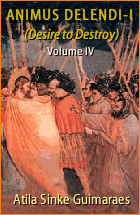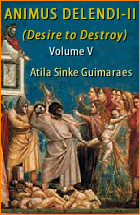Catholic Virtues
 |
 |
 |
 |
 |
 |
 |
The Duty to Fight - 1
A War for the Reign of Christ
One of the meditations of the Spiritual Exercises of St. Ignatius is about the Kingdom of Christ. But, to understand it well, it is necessary to give the historical presuppositions, to see the epoch in which St. Ignatius lived.
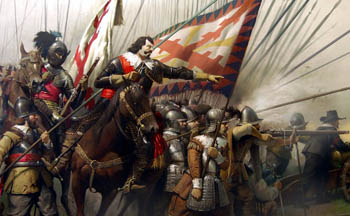 St. Ignatius lived in the 16th century, a time of transition between the feudal regime of the Middle Ages and the absolute monarchy of the Ancien Régime. It was still an aristocratic monarchy, in which the old feudal lords had some authority in the respective fiefs, not the authority they had in the Middle Ages, but it was still a lot of authority.
St. Ignatius lived in the 16th century, a time of transition between the feudal regime of the Middle Ages and the absolute monarchy of the Ancien Régime. It was still an aristocratic monarchy, in which the old feudal lords had some authority in the respective fiefs, not the authority they had in the Middle Ages, but it was still a lot of authority.
By that time, the regular army, as it is conceived today, already existed, but they were much less developed and organized. When a war broke out, the regular army entered the scene, but feudal armies also were present and engaged in the fight. These feudal forces were raised by nobles in their various baronies, counties, duchies, etc., who called for volunteers in their respective lands to join the king's ranks under their personal commands.
There were, therefore, two kinds of troops: the troops in full submission to the king and the troops commanded by nobles.
When a war was about to break out, or even when it was already declared and the royal troops were decimated, the king ordered the nobles to call for volunteers in their respective fiefdoms. That is, the nobles had to convince their men, appealing to rational arguments, to enter the ranks. What today is called a "general mobilization" did not exist yet, so it was necessary to appeal to logic in order to draw the majority of individuals into war.
The Divine King summons his subjects to a divine war
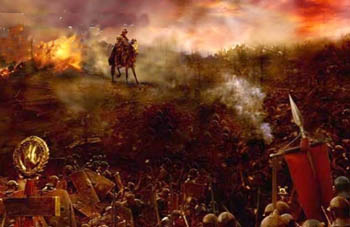 In the meditation on the Kingdom of Christ, St. Ignatius imagines a similar situation.
In the meditation on the Kingdom of Christ, St. Ignatius imagines a similar situation.
He compares Our Lord Jesus Christ to an earthly king – the King of Spain, if you will, since he was Spanish – who is at war and addresses his subjects, calling on them to enter the war for Him. He presents in this way a spiritual situation very similar to the earthly situation that existed in his time.
Our Lord invites the faithful to enter the war on His side, with arguments similar to those used by the kings of that time bid their subjects – through the nobles – to participate in the war. He takes this scenario proper to a military engagement of that time and transposes it to the war for Our Lord Jesus Christ, who he presents as King of the Church Militant.
Divine war against the devil, the world & the flesh
The Church, as you know, is divided into the Church Triumphant or Glorious, the Church Suffering or Penitent and the Church Militant. The Church Glorious is made up of the faithful who are in Heaven, both those who went directly as well as those who passed through Purgatory to make reparation for their sins.
The Church Suffering is constituted by persons who are in Purgatory, making expiation for their faults. And the Church Militant is the one that is on Earth, in battle against the devil, the world and the flesh, which are the enemies of God and enemies of the Church.
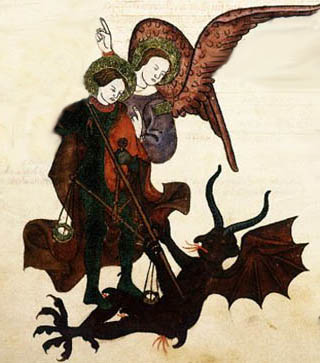 By the devil, we mean that host of condemned rebellious angels who seek to drag men to Hell.The flesh indicates the nature of man stained by original sin, which draws man into evil. The world indicates the organizations, parties and sects that want to impose on Earth a civilization opposed to Catholic Civilization, which helps men to practice the Commandments and save their souls. The present day anti-Catholic civilization makes it difficult to practice the Commandments and causes men to lose their souls.
By the devil, we mean that host of condemned rebellious angels who seek to drag men to Hell.The flesh indicates the nature of man stained by original sin, which draws man into evil. The world indicates the organizations, parties and sects that want to impose on Earth a civilization opposed to Catholic Civilization, which helps men to practice the Commandments and save their souls. The present day anti-Catholic civilization makes it difficult to practice the Commandments and causes men to lose their souls.
The first gives glory to God here on Earth; the pagan or anti-Catholic civilization is an affront to God here on Earth.
The Church is militant because she fights for virtue, for the glory of God, for Catholic Civilization. This is a condition to give glory to God and to practice virtue: to fight against the devil, against the world – that is, against the false pleasures of the world – and against sensuality, that is, the impure pleasures of the flesh. Therefore, it is to fight against all the organizations and sects that defend the work of the devil, the world and the flesh.
Battle in the spiritual & temporal spheres
In our days, therefore, we have two great battles:
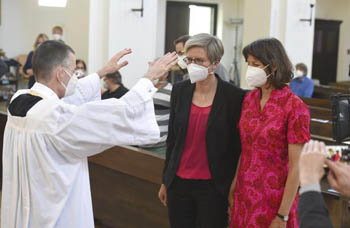
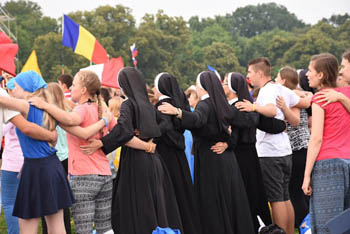 In the spiritual field - First, there is the battle between the two standards in spiritual society, the Catholic Church. Under one banner are those who are truly Roman, Catholic and apostolic, that is, those who follow the Catholic doctrine of all time. Under the other banner are found the progressivists, who, under the pretext of improving the Catholic Religion, want to alter and transform it into a religion opposed to the Religion preached by Our Lord Jesus Christ.
In the spiritual field - First, there is the battle between the two standards in spiritual society, the Catholic Church. Under one banner are those who are truly Roman, Catholic and apostolic, that is, those who follow the Catholic doctrine of all time. Under the other banner are found the progressivists, who, under the pretext of improving the Catholic Religion, want to alter and transform it into a religion opposed to the Religion preached by Our Lord Jesus Christ.
There is, then, a great war inside the Catholic Church: the war of the orthodox, those who maintain the good doctrine, against the progressivist Catholics.
In the temporal field - There is a great analogous battle in the temporal society, that is, in the State. It is the battle of Catholics against communists, who want to transform civil society into a society that has contempt for the laws of Our Lord Jesus Christ, thus denying, on the one hand, all the Commandments, most especially the institution of the family – therefore, purity and chastity in all its aspects, the prolificacy of the family, etc.
On the other hand, they want to deny private property and, in this way, all the fundamental principles of justice in matters of property, goods and the distribution of goods on Earth.
We have, therefore, this battle of Catholics in the Church and in the State. Naturally, communists and progressivists are compatible. The progressivist sympathizes with the communist in civil matters; the communist welcomes the so-called progressivist Catholic and detests the truly counter-revolutionary Catholic, in the sense that the word is used in the work Revolution and Counter-Revolution.
In our time, we have an immense war that encompasses the Earth. It is not a war of gunfire, not a war with bloodshed, at least in the countries of the West. But this war is worse than if it were one of blood: It is a war that divides souls, divides spirits, rips humanity into two currents.
Sublimity of this war
Let us place ourselves, then, in the perspective of St. Ignatius of Loyola, but considering the Militant Church.
Our Lord Jesus Christ, who is King of the Catholic Church, comes to ask us to enter His Holy War inside the Church against Progressivism and inside the State against Communism. He directs to us an appeal to fight, to not be soft men, to not be indifferent to this fight, but to fight with our whole soul. This is the theme of the meditation that he proposes to us.
St. Ignatius, of course, does not speak of Progressivism. Since his meditation is for all times, he refers generically to the world, the devil and the flesh, which are the cause of all the errors of all times. These errors only change their names through the ages.
In his time, the error was Protestantism, supported by the prestige of persons who called themselves Catholic but at heart were Protestant and worked for the advance of Protestantism in the Catholic Church. Such persons strove in the civil field to end political and social inequalities. That is, they were precursors to the French Revolution.
Here, therefore, we enter fully into the Three Revolutions, into R-CR, which we will consider in the next article.
Continued


Spanish warriors under the command of their lord
By that time, the regular army, as it is conceived today, already existed, but they were much less developed and organized. When a war broke out, the regular army entered the scene, but feudal armies also were present and engaged in the fight. These feudal forces were raised by nobles in their various baronies, counties, duchies, etc., who called for volunteers in their respective lands to join the king's ranks under their personal commands.
There were, therefore, two kinds of troops: the troops in full submission to the king and the troops commanded by nobles.
When a war was about to break out, or even when it was already declared and the royal troops were decimated, the king ordered the nobles to call for volunteers in their respective fiefdoms. That is, the nobles had to convince their men, appealing to rational arguments, to enter the ranks. What today is called a "general mobilization" did not exist yet, so it was necessary to appeal to logic in order to draw the majority of individuals into war.
The Divine King summons his subjects to a divine war

St. Ignatius imagines a call by Christ to battle
He compares Our Lord Jesus Christ to an earthly king – the King of Spain, if you will, since he was Spanish – who is at war and addresses his subjects, calling on them to enter the war for Him. He presents in this way a spiritual situation very similar to the earthly situation that existed in his time.
Our Lord invites the faithful to enter the war on His side, with arguments similar to those used by the kings of that time bid their subjects – through the nobles – to participate in the war. He takes this scenario proper to a military engagement of that time and transposes it to the war for Our Lord Jesus Christ, who he presents as King of the Church Militant.
Divine war against the devil, the world & the flesh
The Church, as you know, is divided into the Church Triumphant or Glorious, the Church Suffering or Penitent and the Church Militant. The Church Glorious is made up of the faithful who are in Heaven, both those who went directly as well as those who passed through Purgatory to make reparation for their sins.
The Church Suffering is constituted by persons who are in Purgatory, making expiation for their faults. And the Church Militant is the one that is on Earth, in battle against the devil, the world and the flesh, which are the enemies of God and enemies of the Church.

A good Angel protects a faithful from the Devil
The first gives glory to God here on Earth; the pagan or anti-Catholic civilization is an affront to God here on Earth.
The Church is militant because she fights for virtue, for the glory of God, for Catholic Civilization. This is a condition to give glory to God and to practice virtue: to fight against the devil, against the world – that is, against the false pleasures of the world – and against sensuality, that is, the impure pleasures of the flesh. Therefore, it is to fight against all the organizations and sects that defend the work of the devil, the world and the flesh.
Battle in the spiritual & temporal spheres
In our days, therefore, we have two great battles:

A German priests blesses a lesbian 'marriage' inside the Church; below, nuns join in an ecumenical prayer

There is, then, a great war inside the Catholic Church: the war of the orthodox, those who maintain the good doctrine, against the progressivist Catholics.
In the temporal field - There is a great analogous battle in the temporal society, that is, in the State. It is the battle of Catholics against communists, who want to transform civil society into a society that has contempt for the laws of Our Lord Jesus Christ, thus denying, on the one hand, all the Commandments, most especially the institution of the family – therefore, purity and chastity in all its aspects, the prolificacy of the family, etc.
On the other hand, they want to deny private property and, in this way, all the fundamental principles of justice in matters of property, goods and the distribution of goods on Earth.
We have, therefore, this battle of Catholics in the Church and in the State. Naturally, communists and progressivists are compatible. The progressivist sympathizes with the communist in civil matters; the communist welcomes the so-called progressivist Catholic and detests the truly counter-revolutionary Catholic, in the sense that the word is used in the work Revolution and Counter-Revolution.
In our time, we have an immense war that encompasses the Earth. It is not a war of gunfire, not a war with bloodshed, at least in the countries of the West. But this war is worse than if it were one of blood: It is a war that divides souls, divides spirits, rips humanity into two currents.
Sublimity of this war
Let us place ourselves, then, in the perspective of St. Ignatius of Loyola, but considering the Militant Church.
Our Lord Jesus Christ, who is King of the Catholic Church, comes to ask us to enter His Holy War inside the Church against Progressivism and inside the State against Communism. He directs to us an appeal to fight, to not be soft men, to not be indifferent to this fight, but to fight with our whole soul. This is the theme of the meditation that he proposes to us.
St. Ignatius, of course, does not speak of Progressivism. Since his meditation is for all times, he refers generically to the world, the devil and the flesh, which are the cause of all the errors of all times. These errors only change their names through the ages.
In his time, the error was Protestantism, supported by the prestige of persons who called themselves Catholic but at heart were Protestant and worked for the advance of Protestantism in the Catholic Church. Such persons strove in the civil field to end political and social inequalities. That is, they were precursors to the French Revolution.
Here, therefore, we enter fully into the Three Revolutions, into R-CR, which we will consider in the next article.
Continued

Posted March 21, 2022






